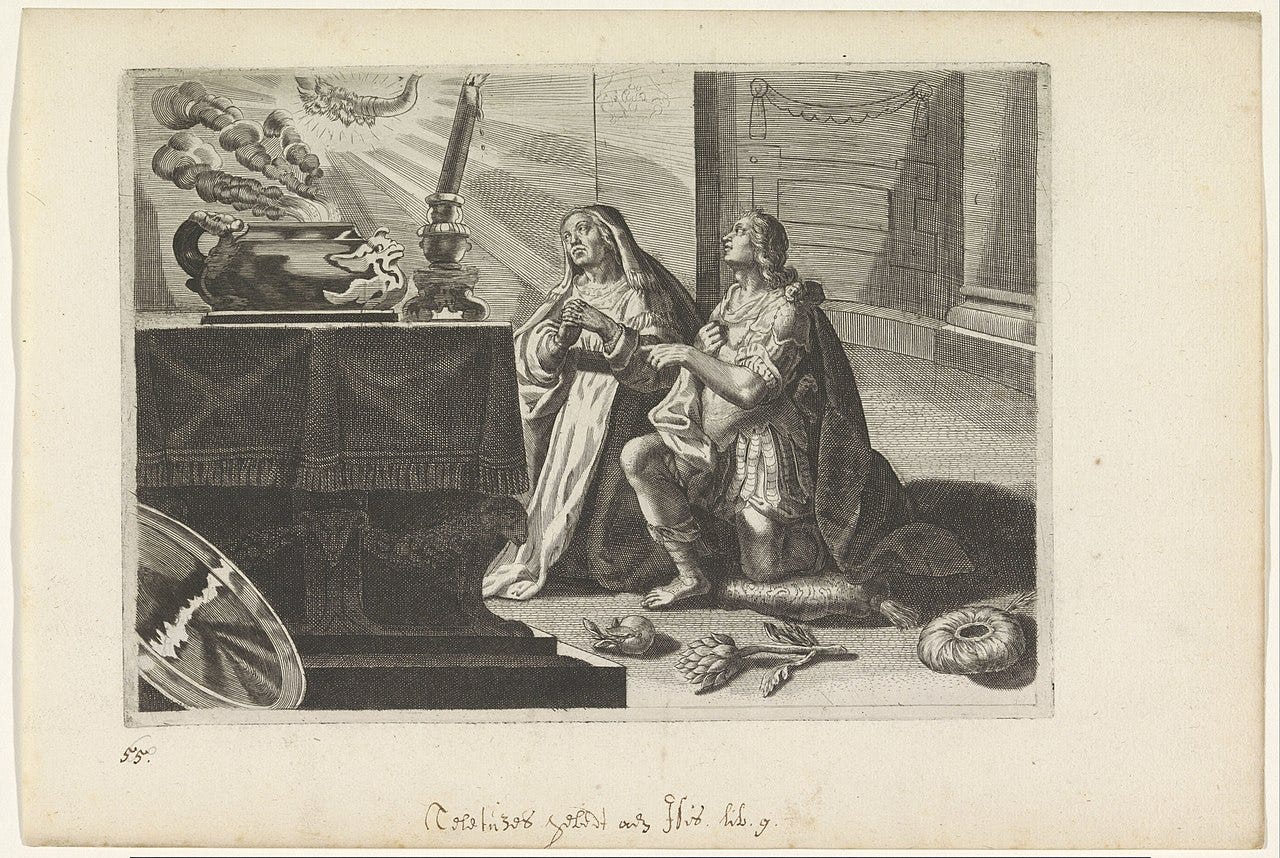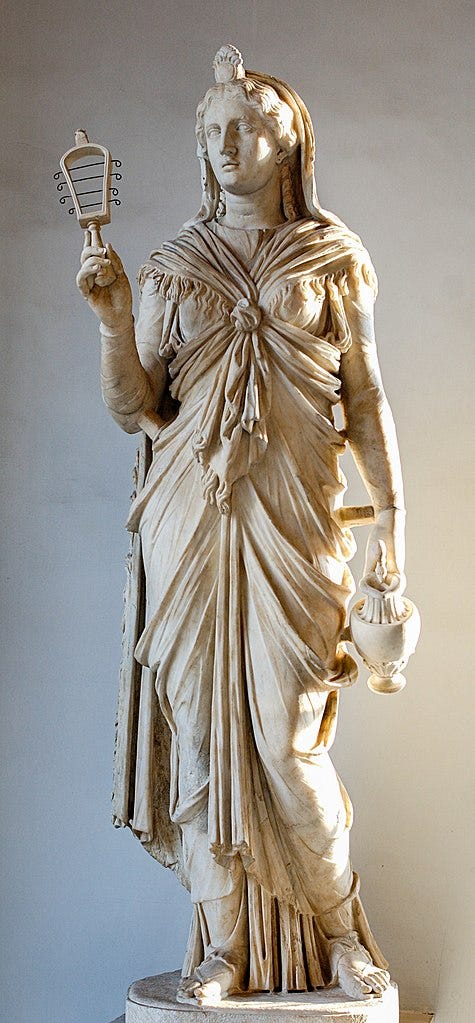Iphis and Ianthe: A Trans Affirming or Lesbophobia Tale?
A lesson in the limitations of seeking ancient wisdom
Welcome to June, and happy pride month! For the next 30 days, I initially wanted to spend time examining ancient tales of trans individuals. With trans rights under increased attack, I wanted to jumpstart the month diving into myths of Greek and Roman antiquity depicting trans individuals. Despite what social conservatives may say, trans individuals have always existed since ancient times and have taken many forms and shapes across different cultures. Affirming the truth of this is more important now than ever under a crush of books bans and regressive politics.
However, when I began to dig into the first tale I wanted to cover from Ovid’s Metamorphoses, I found myself in for complex feelings and disappointment. Isis is one of the goddesses I am devoted to, and I was initially delighted to find a tale with her miracles at the center after I was introduced to the story by reading M Isidora Forrest's essay "Iphis, Ianthe, and Isis, the LGBT-friendly Goddess". The actual text, however, is less than affirming and greatly reflects the prejudices of the day. I’d like to grapple with some of that complexity while searching for values we can apply today as we look at an ancient trans masculine figure.
The Tale of Iphis and Ianthe
Long ago in Crete, lived a husband and wife, Ligdus and Telethusa. They were a family of humble origins, and when Telethusa fell pregnant, Ligdus made clear to his wife that should the child be a girl then it would to be put to death. Telethusa and Ligdus both wept at his words but though Telethusa begged, Ligdus would not yield in his wish to not have a daughter.
Near the time of birth, the goddess Isis appeared to Telethusa. She was dressed regally with her crescent horns adorning her forehead with a procession of other gods and spirits in her company. Isis spoke to Telethusa, telling her to ignore her husband’s wishes and raise the child whether it be a girl or a boy for Isis would not ignore her prayers. The vision heartened the Cretan woman and she praised Isis with her hands to the stars.
Telethusa delivered the baby, and it was a girl. She concealed this from Ligdus and the child was named Iphis, one of the few gender neutral names in their language. Iphis grew well, possessed of a beauty that suited either a boy or a girl. With the passing of time, Ligdus found Iphis a bride in the golden haired Ianthe whose dowry was her beauty. Iphis and Ianthe fell deeply in love with Ianthe unaware of the gender of her betrothed.
Iphis was anguished by this. While they greatly desired to be with Ianthe, they could only see the union as unnatural. What cow inflames for a cow, what mare for a mare? They compared the potential of the marriage to the creation of the minotaur: when Pasiphae was seized with desired for the bull meant for sacrifice to Posiedon. Telethusa for her part did was best she could to delay the marriage with omens and pretended illness, but finally the time for marriage was at hand.
As a last resort, Telethusa brought Iphis the temple of Isis and cried out, throwing herself at the feet of the goddess. She cried out for aid sincerely, reminding the goddess of her vision all those years ago. In response, the temple itself shook and the horns of Isis flashed. The jingle of her sacred instrument, the sistrum, was heard.
As they began the trip back home, Iphis began to change in appearance. Their hair grew shorter, their stride lengthened and their features grew more stern. They were now a man. The marriage with Ianthe finally came and the two were finally joined in matrimony.
The Prejudice of the Past Echoed in the Present
Ovid presents a story in a way which confirms the lesbophobia of Rome. Though homosexuality between men was present in Rome, the emphasis was on men taking the penetrative role in the sexual act. To receive the act was to be submissive and feminine and thus risk mockery and social ostracization. Beyond that, very little is written of lesbian relationships likely due to the diminished social status of women in addition to the phallus being the primary lens through which sex was viewed.
In the speech Iphis delivers in the heart of the story, they clearly conceive of themselves as being monstrous in their desire with no models for sapphic love in their life. In my personal reading, my heart breaks for Iphis at this point. They’re from a humble family likely dealing with some degree of poverty. Their father Ligdus can’t see any way to move forward other than killing his child if it’s not born of the higher social standing of a male. Though Ovid doesn’t mention any particular hardship, times are clearly not great for them.
Thus, I can’t help but see Iphis as an analogy for so many LGBT youth. Living in a small town and never hearing anything other than Biblical fundamentalism, so many can’t see any way forward other than compulsory heterosexuality that eats at their very being. Many conceive of themselves as monstrous or being possessed by demons for having natural desires. And even if they comes to accept their feelings, they know they’ll face community rejection and ostracization on the same level as bestiality or incest. I don’t think it’s happenstance that Iphis mentions the minotaur in their speech or that this tale in the anthology comes directly after Byblis, a sister consumed with desire for her brother.
Finally, we don’t really know if Iphis is even trans or merely takes on the role of a man after their transformation to fulfill societal expectations in their marriage. In the words of Iphis, we never hear talk about gender dysphoria or being in the wrong body, just exclamations of not wanting to be a lesbian. We do see signs that Iphis is satisfied with the transformation, however, as they later make offerings as the shrine of Isis along with a votive tablet inscribed “these gifts are paid by Iphis as a man which as a maid he vowed to give.” We just don’t know if this offering is made in thanks because their marriage to their beloved can now proceed or if it is in gratitude for feeling aligned now with their body.
The Role of Isis
The goddess Isis plays a critical role in the tale. Though Isis was originally from Egypt, her tale was imported and became important as part of the cult of Isis starting with the Greeks and passing to the Romans. The cult was popular amongst women so a woman like Telethusa being amongst her devotees wouldn’t have been seen as strange in a book of Roman tales. Isis was a personable goddess who came to the aid of her followers as she promised Telethusa
O Telethusa, one of my remembered worshippers, forget your grief; your husband's orders need not be obeyed; […] save and bring up your child, if either boy or girl. I am the goddess who brings help to all who call upon me; and you shall never complain of me—that you adored a thankless deity.
Rather than hormone replacement therapy or other gender affirming care, Isis is the one who literally transforms in this story. She reshapes the body of Iphis to be socially acceptable for marriage, and Iphis as mentioned gives an offering to her after the transformation. Isis comes through for her follower when it matters the most.
However… can this be construed as Isis enforcing heterosexuality as more natural or correct than homosexuality? I don’t read it that way. Gods works within the societies they operate and changing Iphis’s body was a more reasonable miracle than changing the entire operating structure and perception of the ancient Mediterranean to accept a lesbian union. The statue of Idet and Ruiu in a same sex relationship housed at the Egyptian Museum of Turin is an example that same sex relationships between women wouldn’t have been unknown to Isis in her land of origin. Just as today, however, prejudices varied across lands and across centuries, making some magical solutions more feasible than others.
The Flaw of Ancient Widsom
Reviewing the tale of Iphis and Ianthe in many ways leaves us knowing more about the flaws of thinking in men like Ovid and the prejudices of his time than with a trans affirming message. However, some scraps can be gathered from the tale.
We get further confirmation that trans people existed even in ancient times. Whether this was due to hiding birth gender to be able to marry who you love or if it was due to gender dysphoria is unclear. We can also see a lack of social acceptance for certain forms of relationships that spans millennia. Prejudice is not new and must be fought in every era in which it appears. Finally, we see a tale of the power of prayer. Miracles can be delivered by our gods and goddesses. Though their worship has been driven underground, they heard our cries long ago and those of us who call to them know they still do today.







